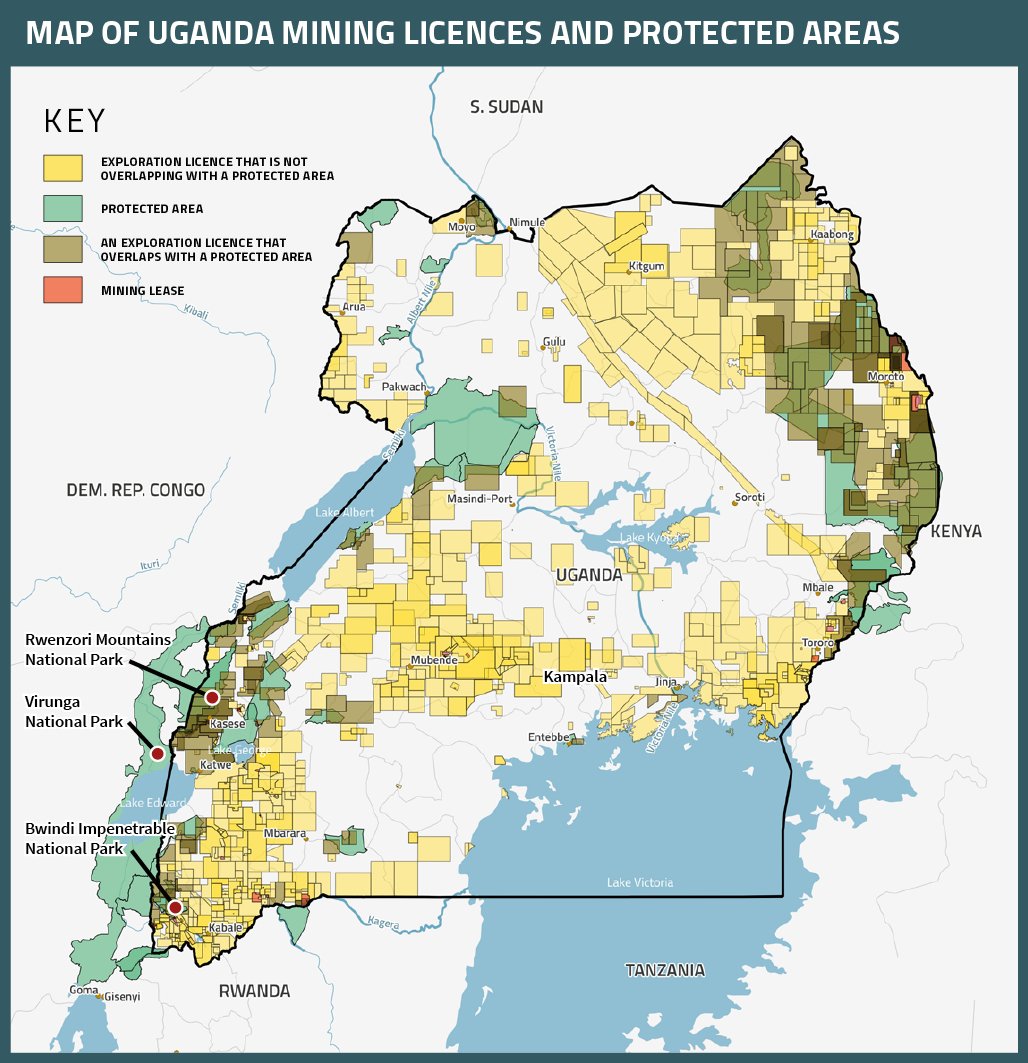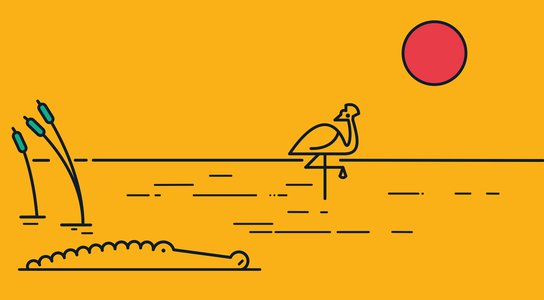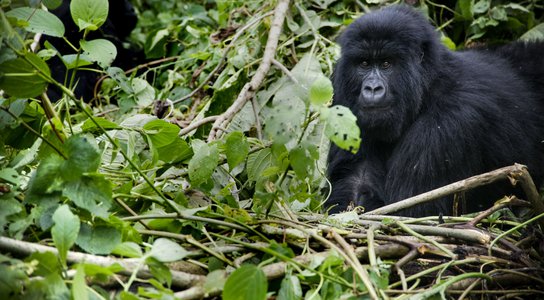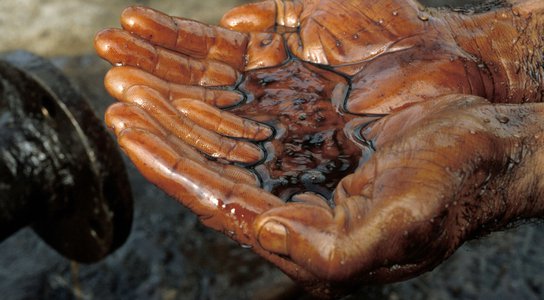Uganda is rich in natural resource wealth such as gold, tin and phosphate that could create jobs and support the country’s developing economy by generating tax revenues.
However, our 18 month long investigation has exposed endemic corruption and mismanagement in the country’s fledgling mining sector that means crooked officials, and international investors are profiting at the expense of Uganda’s people, environment and economy.
Key findings of the investigation include:
- Miners are working in dangerous, largely
unregulated conditions – with children
exposed to toxic chemicals on a daily basis
- Almost half the world’s remaining mountain
gorillas are at risk as mining threatens Bwindi and Rwenzori national parks,
part of the famous Virunga ecosystem, and also risks the economically
critical tourism industry which depends on the country’s natural beauty and wildlife
- The country is deprived of tax revenues that could be spent on schools, hospitals
and roads
- Minerals from the Democratic Republic of Congo
and South Sudan - that might be funding
conflict and human rights abuses – pass through Uganda on their way to
international markets
People losing land and livelihoods
During the course of our investigation we spoke to a boy called David, aged fifteen. He had been intimidated and confused by mining company representatives into handing over the rights to his family’s land, their only source of wealth, which had been placed in his name as the eldest child.
While the compensation he and his mother received was sufficient to build a house on a small plot of land, the family can no longer grow enough crops to feed themselves and sell at the market to make a living. David has had to drop out of school because they can’t afford the fees; he now breaks rocks at the side of the road to sell to a local cement factory.
His family are among the many victims of pressure placed on communities in Tororo, Eastern Uganda as a result of the rush to develop the phosphate mine at the Sukulu Phosphate Project. The fledgling mining sector could help raise families like David’s out of poverty, but corruption and mismanagement is stifling investment and preventing local communities from seeing any benefits.
NEW REPORT: Corruption and mismanagement in #Uganda’s mining sector threatens people and environment https://t.co/AiBgFKCNOW #Undermined pic.twitter.com/WMBXv4sKPh
— Global Witness (@Global_Witness) June 5, 2017
Those who do work in the sector often do so in dangerous conditions. Global Witness visited gold mines where children use mercury with bare skin, and two miners died in accidents in the country’s largest copper mine which was operating without the correct environmental impact assessment.
Ecosystems at risk
The Ugandan authorities have granted mining exploration licences in all but three of Uganda’s 28 protected areas, putting some of the planet’s rarest and most endangered species at risk – including mountain gorillas.
Bwindi National Park, resting in the cloud-covered mountains on the border of Democratic Republic of Congo, is a well-known biodiversity hotspot and home to half of the world’s remaining mountain gorillas. Records show that over twenty companies and individuals have held mining exploration licences which lie at least partly inside the World Heritage Site or immediately adjacent to it – despite the obvious threat to the wildlife there.
In one story we uncovered, an MP told us she was able to carry out mining activities in Bwindi because the former tourist minister Maria Mutagamba was a “good good friend.”
This map illustrates the scale of the threat :

Corruption goes all the way to the top
Uganda’s mining sector is officially run by the Directorate of Geological Survey and Mines (DGSM), which has a mandate to work for the benefit of the Ugandan people. Instead, it is controlled by a ‘shadow system’ which benefits predatory investors and politically powerful Ugandans.
- Poorly qualified companies can win licenses based on their connections, at the expense of well-qualified and conscientious companies.
- The absence of respect for the rule of law and the systemic circumvention of policies and procedures undermines investment and puts Ugandans and their environment at risk
- The underpayment or complete failure to pay taxes, mineral rents and royalties by many of those operating in the sector deprives the public coffers of millions of dollars a year
From low-level officials to senior political figures, many of those involved with mining in Uganda are ready to bend or break the rules. We’ve uncovered parts played by lawyers, a Member of Parliament (MP), foreign-backed investors, and even a pop star in the exploitation of Uganda’s mineral wealth at the expense of ordinary people and the country’s long-term development.
Corruption in #Uganda's mining sector is undermining @UNESCO World Heritage sites - home to many endangered animals https://t.co/AiBgFKUpdw pic.twitter.com/0hLMCxgbje
— Global Witness (@Global_Witness) June 6, 2017
Next steps: Uganda at a crossroads
Right now, there is an opportunity for change. The President of Uganda recently made the mining sector a priority and the government has been working with the World Bank to reform the mining law. But the system needs a radical overhaul to ensure that transparency, accountability and environmental and social safeguards can prevail over self-interest and political patronage. Civil society groups in Uganda have produced these recommendations for reform of the mining law.
At this crucial time for Uganda, we hope our investigation will support these efforts by helping:
- the Ugandan government to identify the loopholes and regulatory failings that let this corruption prevail and work with civil society and MPs, and with the support of the country’s international development partners, to close them
- law enforcement agencies and accountability institutions to conduct further investigations and hold the corrupt to account
- civil society to challenge the corruption, mismanagement and political influence which dominate the mining sector
- challenge investors to uphold higher standards
- international donors to target their assistance to improve governance in the mining sector
Global Witness wrote to all of the people and companies named in this report to ask for comment. The responses we received are referenced and referred to throughout the text of the report. Further details of the responses we received can also be found in the annexes.


